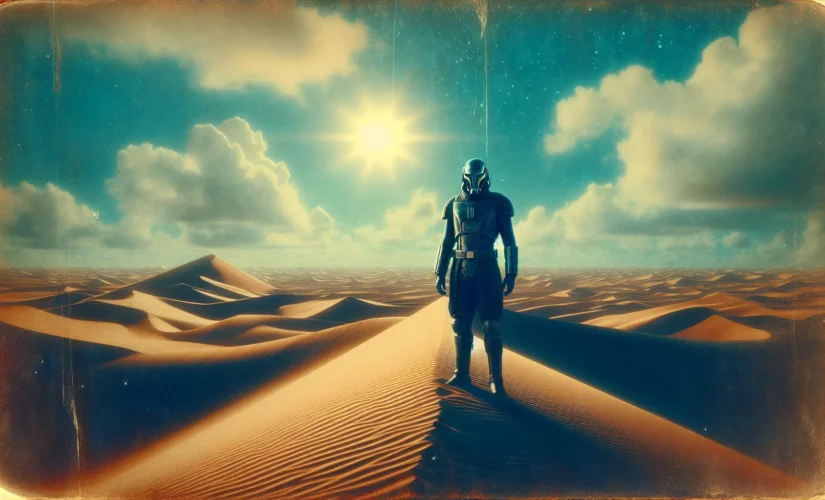If you’ve ever picked up Frank Herbert’s Dune and found yourself lost in its intricate world, you’re not alone. This sci-fi masterpiece is celebrated for its depth but can feel overwhelming with its complex terminology, layered politics, and dense storytelling. It’s not just a book; it’s an entire universe packed with ideas that demand your full attention.
You might struggle to keep track of the sprawling cast of characters, unfamiliar terms like “Kwisatz Haderach,” or the subtle power plays shaping the story. Herbert doesn’t spoon-feed you; instead, he immerses you in a richly detailed world, expecting you to connect the dots. It’s this very complexity, though, that makes Dune so rewarding for those who stick with it.
Understanding why Dune feels so challenging is the first step to unlocking its brilliance. Once you grasp its unique structure and themes, you’ll see why it remains a sci-fi classic.
The Complexity Of Dune’s Narrative
Dune’s narrative is layered with themes, political intrigue, and detailed settings that challenge readers to follow its intricate structure. Its depth demands close attention to understand the nuances embedded throughout the story.
The Multi-Layered Storyline
The storyline intertwines multiple plotlines involving power struggles, family dynamics, and religious undertones. For instance, Paul Atreides’ journey explores themes of destiny and leadership while tackling conflicts with rival houses like House Harkonnen. These concurrent elements require you to navigate shifting perspectives and interrelated events.
The Extensive World-Building
Herbert constructs a detailed universe with unique cultures, ecosystems, and languages. Arrakis, the desert planet, serves as the focal point and introduces complex elements like spice production and Fremen society. Advanced terms such as ‘melange’ and ‘Bene Gesserit’ need contextual understanding, emphasizing the depth of the fictional world you encounter.
The Political And Philosophical Themes
The narrative weaves intricate political systems and philosophical debates into its core. Power dynamics between the Emperor, noble houses, and the Landsraad highlight systemic conflicts. Simultaneously, Dune’s exploration of free will, religion, and environmentalism challenges you to reflect on deeper ideas intertwined with the plot.
The Challenges Of Herbert’s Writing Style

Frank Herbert’s writing style in Dune presents unique challenges for readers, demanding close attention to detail and patience. His approach blends complexity and subtlety, creating a narrative that doesn’t yield its secrets easily.
Dense Prose And Vocabulary
Herbert’s prose incorporates intricate sentence structures and specialized vocabulary that can slow your reading pace. Words like “Kwisatz Haderach,” “gom jabbar,” and “melange” aren’t just unfamiliar—they carry significant narrative and thematic weight. You encounter context-dependent terms without immediate explanation, requiring effort to understand their role in the story. This dense language mirrors the complexity of the Dune universe but makes initial comprehension more demanding.
Nonlinear Storytelling
The nonlinear structure of the narrative presents multiple temporal shifts, character perspectives, and subplots. Herbert introduces scenes with limited background, expecting you to piece together events over time. The use of internal monologues, prophetic visions, and flashbacks adds complexity, making it challenging to align chronological sequences on a first read. By fragmenting the narrative, Herbert mirrors the layered political and spiritual conflicts within the story.
Minimal Exposition
Herbert omits traditional exposition, immersing you in the world without preambles. Information about factions, relationships, and cultural practices unfolds gradually, often through dialogue or action. This approach assumes you’re attentive and willing to infer connections rather than relying on explicit descriptions. While this minimalism enhances immersion, it raises the difficulty of understanding critical details without extensive rereading.
The Influence Of The Dune Universe

The Dune universe’s vast scope and intricate design contribute significantly to its complexity. Understanding its cultural, ecological, and political systems is key to unraveling the layers of the narrative.
Understanding The Fremen Culture And Ecology
The Fremen society is central to the Dune universe. Their deep connection to Arrakis’ desert environment shapes their identity, customs, and survival strategies. Their survival mechanisms, such as water discipline and stillsuits, reflect their adaptation to the harsh conditions of the desert. Their reverence for sandworms, pivotal to spice production, underscores their symbiotic relationship with Arrakis’ ecosystem. You encounter terms and practices rooted in their culture, which demand attention for full comprehension.
The Impact Of The Spice Melange
The spice melange serves as the foundation of the universe’s economy, politics, and power dynamics. It extends life, enhances mental abilities, and enables interstellar travel through the Spacing Guild’s navigators. This dependence positions spice as the most valuable resource, linking Arrakis to galactic politics. You observe its influence on social hierarchies and personal ambitions, with factions like the Bene Gesserit and House Corrino vying for control. Its presence permeates the narrative, requiring you to grasp both its tangible and symbolic significance.
Intricacies Of The Power Struggles
The power struggles in Dune are multifaceted, involving Houses, political factions, and religious orders. The feudal system, with Houses such as Atreides and Harkonnen, forms the backbone of these conflicts. You follow Paul Atreides’ personal journey entwined with larger conspiracies and betrayals. The Emperor’s manipulations, Bene Gesserit’s selective breeding program, and the CHOAM corporation’s economic schemes fuel these tensions. Recognizing how these entities and their motives intersect is essential to comprehending the layers of conflict within the story.
Why Dune’s Complexity Is Its Strength

Dune’s layered intricacy transforms it from a simple narrative into a profound exploration of human experience and universal questions. Its complexity challenges you to engage deeply, making the journey both intellectually and emotionally rewarding.
Encouraging Multiple Readings
The depth of Dune invites you to revisit its pages to uncover details missed during your initial reading. Each layer of the story—be it political schemes, spiritual philosophies, or ecological intricacies—contains subtleties that reveal themselves over time. Repeated readings enhance your understanding of terms like “Bene Gesserit” or “Landsraad” by connecting them to broader themes of power and influence. The nonlinear structure provides fresh insights with every revisit as you’re able to track the narrative from diverse character perspectives more cohesively.
Inspiring Critical Thinking And Interpretation
Dune compels you to question the societal and ethical constructs driving the story. Its exploration of themes like resource exploitation through the dependence on spice melange parallels real-world issues, offering you opportunities to draw meaningful comparisons. The portrayal of leadership and prophecy challenges you to reflect on the consequences of centralized power through Paul Atreides’ rise and the manipulation of religious beliefs. You actively interpret the philosophical and ecological dilemmas presented, fostering deeper analytical thinking as you navigate Herbert’s thought-provoking commentary on survival, autonomy, and societal evolution.
Conclusion
Dune’s complexity may feel daunting at first, but it’s this very depth that makes it a masterpiece worth exploring. By embracing its layered narrative, intricate world-building, and thought-provoking themes, you unlock a story that challenges and rewards in equal measure.
Each detail, from its political intrigue to its philosophical undertones, invites you to think critically and immerse yourself in a universe unlike any other. With patience and curiosity, you’ll discover that Dune isn’t just a story—it’s an experience that stays with you long after you’ve turned the final page.
Frequently Asked Questions
What makes Dune so complex for readers?
Dune is complex due to its dense narrative, intricate world-building, and specialized terminology. Frank Herbert introduces unique cultures, political systems, and ecological intricacies without extensive exposition, requiring readers to piece together context. The nonlinear storytelling and layered themes also contribute to its depth, demanding close attention to detail and fostering multiple interpretations.
Why is the spice melange so important in Dune?
Melange, or spice, is central to the Dune universe as it powers interstellar travel, extends life, and enhances mental abilities. Its economic value creates power struggles among factions. Found only on Arrakis, it forms the backbone of the story’s ecological, political, and social dynamics.
How does the Fremen culture contribute to the story?
The Fremen culture is vital to Dune, showcasing survival adapted to Arrakis’ harsh desert environment. Their water-saving practices, spiritual beliefs, and intimate connection to the land highlight themes of resource scarcity and environmentalism. Their alliance with Paul Atreides heavily influences the narrative’s outcome.
What are the key themes in Dune?
Key themes in Dune include power dynamics, free will, religion, and environmentalism. Frank Herbert explores how political schemes, resource control, and spiritual manipulation shape societies and personal ambitions. These themes prompt reflection on real-world parallels, making the book deeply thought-provoking.
Why does Frank Herbert’s writing style pose challenges?
Herbert’s dense prose, specialized vocabulary, and minimal exposition can make Dune challenging to follow. He avoids spoon-feeding details, requiring readers to infer meanings from dialogue and context. Temporal shifts and multiple perspectives further complicate the storytelling, rewarding patience and close reading.
Is Dune worth reading despite its complexity?
Absolutely. Dune’s complexity is its strength, transforming it into a profound exploration of humanity, ethics, and universal questions. Each layer uncovers new insights on politics, ecology, and philosophy. Its immersive world and thought-provoking themes make it a rewarding read for dedicated readers.
What role does Paul Atreides play in the story?
Paul Atreides is the central figure in Dune, navigating political conspiracies, family loyalty, and spiritual evolution. His journey from heir to potential savior intertwines with the narrative’s broader themes of power, religion, and ecological stewardship. His transformation drives the overarching plot.
Why does Dune require multiple readings?
Dune’s depth and intricate layers are best appreciated through multiple readings. Each re-read uncovers new details about its characters, political systems, and philosophical themes. Understanding its complex terminology and nonlinear structure often improves with familiarity, enriching the experience.
What are some of the hardest terms to understand in Dune?
Terms like “Kwisatz Haderach,” “gom jabbar,” and “melange” can be challenging without context. These terms hold significant thematic weight, tied to spiritual concepts, political strategies, and resource importance in the Dune universe. Gradually, their meaning unfolds through the narrative.
How does Dune relate to real-world issues?
Dune mirrors real-world issues like resource exploitation, centralized power, and environmental sustainability. Its themes of ecological balance, political intrigue, and societal dependence on finite resources resonate with contemporary concerns, fostering critical thinking about humanity’s future.




